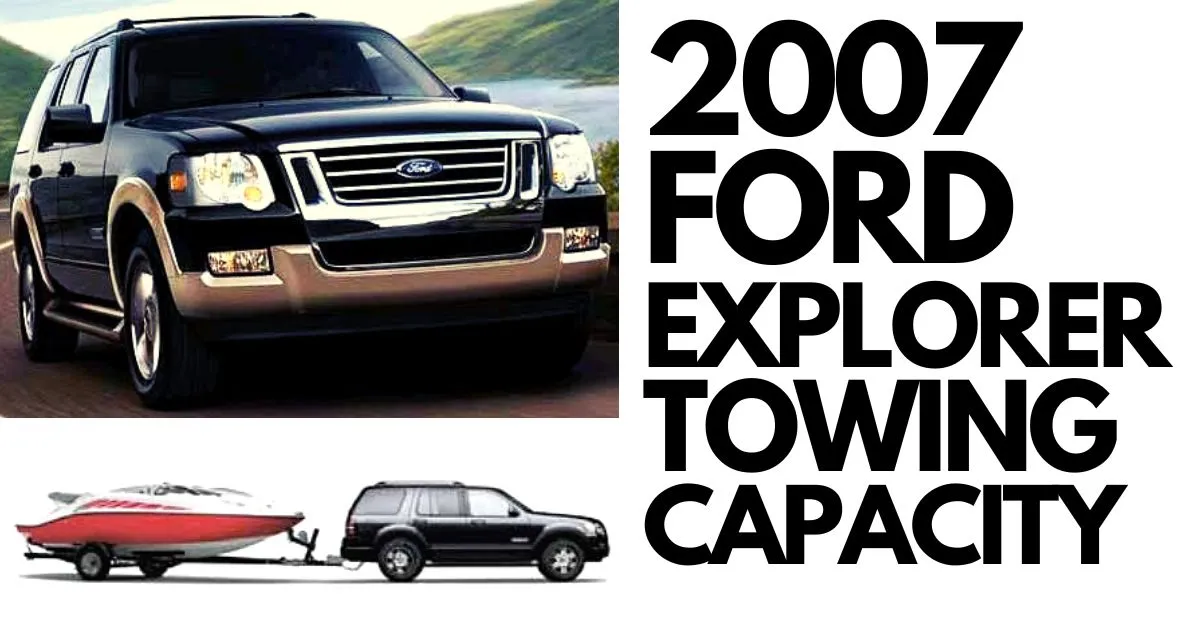2007 Ford Explorer towing capacity chart
The 2007 Ford Explorer’s versatile, strong, powerful, reasonable size, and exceptional adaptability make it a great choice for families looking for an all-rounder SUV. The full-sized SUV, with higher ground clearance and four-wheel-drive capability, has a smooth, quiet ride, and a fully boxed frame that’s remarkable. The proven off-roader with a powerful towing machine that is very comfortable and accommodating, with room for all your belongings. In this article let’s take a look at the trim, engine options, features, and the 2007 Ford Explorer’s towing capacity in detail.
| 2007 Ford Explorer trim levels | 2007 Ford Explorer towing capacity |
| Ford Explorer XLT | 3,500 – 7,290 lbs. |
| Ford Explorer EDDIE BAUER | 3,500 – 7,290 lbs. |
| Ford Explorer Limited | 3,500 – 7,290 lbs. |
Table of Contents
Towing trailers beyond the maximum recommended gross trailer weight exceeds the limit of your vehicle and could result in engine damage, transmission damage, structural damage, loss of vehicle control, vehicle rollover, and personal injury. Do not exceed the GVWR or the GAWR specified on the certification label.
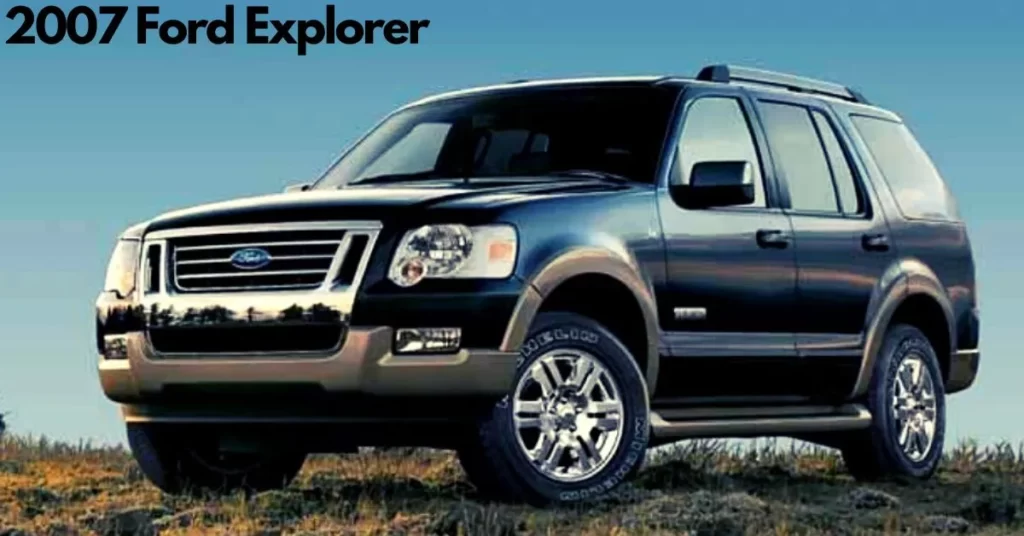
2007 Ford Explorer Engine Specs
The standard 4.0L SOHC V6 engine pumps out 210 hp and 254 lb.-ft. of torque matched with a 5-speed automatic transmission, the V6 delivers an EPA-estimated 15 mpg in the city and 21 on the highway (4×2 models). The optional 4.6L 3-valve V8 engine and its first-in-class 6-speed automatic transmission give you 292 hp and they deliver more mpg on the highway. When properly equipped, Explorer 4×2 with the V8 engine can tow up to 7,290 lbs.
| Engine | 4.0L SOHC V6 | 4.6L 3V V8 |
| Horsepower | 210 hp @ 5,100rpm | 292 hp @ 5,700rpm |
| Torque | 254 lb.-ft. @ 3,700rpm | 300 lb.-ft. @ 3,950 rpm |
Note: Specific states require electric trailer brakes for trailers over a specified weight. Be certain to review state regulations for this determined weight. The maximum trailer weights listed could be limited to this specified weight, as the vehicle’s electrical system may not include the wiring connector needed to activate electric trailer brakes.
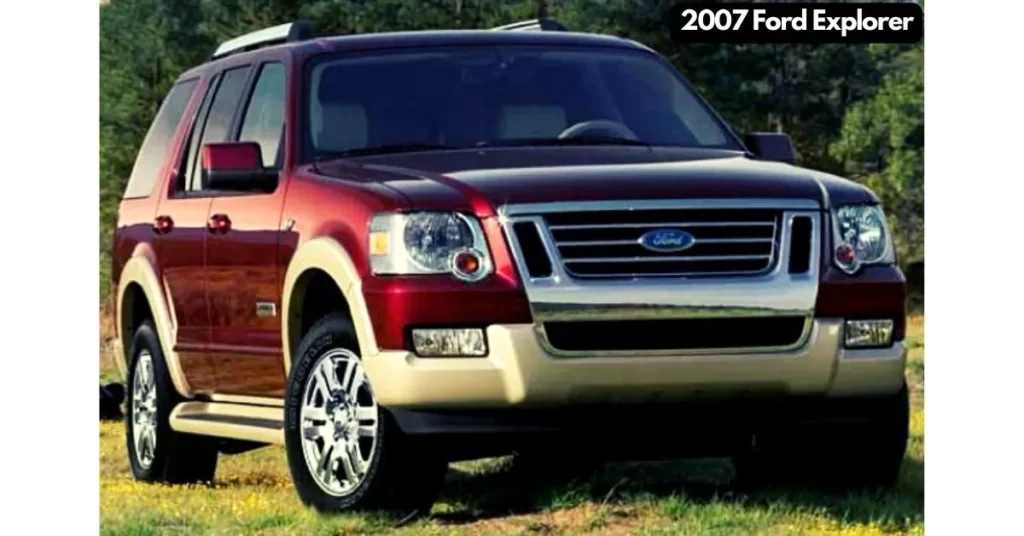
2007 Ford Explorer 4×2 towing capacity
| Engine | Trailer Class towing | Axle Ratio | GCWR (lbs.) | Maximum Trailer Weight (lbs.) |
| 4.0L SOHC V6 | Class II Class III/IV | 3.55 3.73 | 8,500 10,000 | 3,500 5,370 |
| 4.6L 3V V8 | Class II Class III/IV | 3.55 3.55 | 8,500 12,000 | 3,500 7,290 |
2007 Ford Explorer Class III/IV Trailer Tow Package
The trailer towing packages increase your Explorer’s towing capacity. Each allows for heavier hauls and expands the options of what you can take with your SUV. When properly equipped with Class III/IV Trailer Tow Package for maximum towing capabilities. Towing a trailer places an extra load on your vehicle’s engine, transmission, axle, brakes, tires, and suspension. Check these parts periodically during, and after, any towing function.
Also Read: What is the difference between Class 3 and Class 4 trailer hitch? Hitch receiver types and sizes are important when you are towing trailers, campers, RVs, or other equipment with your vehicle. There are different trailer hitch classes available in the market with unique characteristics. Explore the major difference between Class 3 and Class 4 Trailer Hitch (With Comparison). Read more....
Class III/IV Trailer Tow Package
- 7-pin trailer wiring harness and connector.
- 7- to 4-pin adapter.
- Frame-mounted hitch receiver. (3.73 non-limited-slip rear axle required and only available with 4.0L V6)
Maximum towing capabilities are for properly equipped vehicles with required equipment and vary based on cargo, vehicle configuration, accessories, option content and number of passengers. See label on door jamb for carrying capacity of a specific vehicle. For additional information, see your vehicle owner's manual.
2007 Ford Explorer 4×4 towing capacity
| Engine | Trailer Class towing | Axle Ratio | GCWR (lbs.) | Maximum Trailer Weight (lbs.) |
| 4.0L SOHC V6 | Class II Class III/IV | 3.55 3.73 | 8,500 10,000 | 3,500 5,200 |
| 4.6L 3V V8 | Class II Class III/IV | 3.55 3.55 | 8,500 12,000 | 3,500 7,115 |
Reminder: Ford Explorer does not offer factory-installed towing equipment for this application; only available as a dealer accessory. Do not exceed the trailer weight for your vehicle configuration listed in the chart above. Maximum weights shown are for properly equipped vehicles with required equipment and a 150-lb. driver. Weight of additional options, equipment, passengers and cargo must be deducted from this weight.
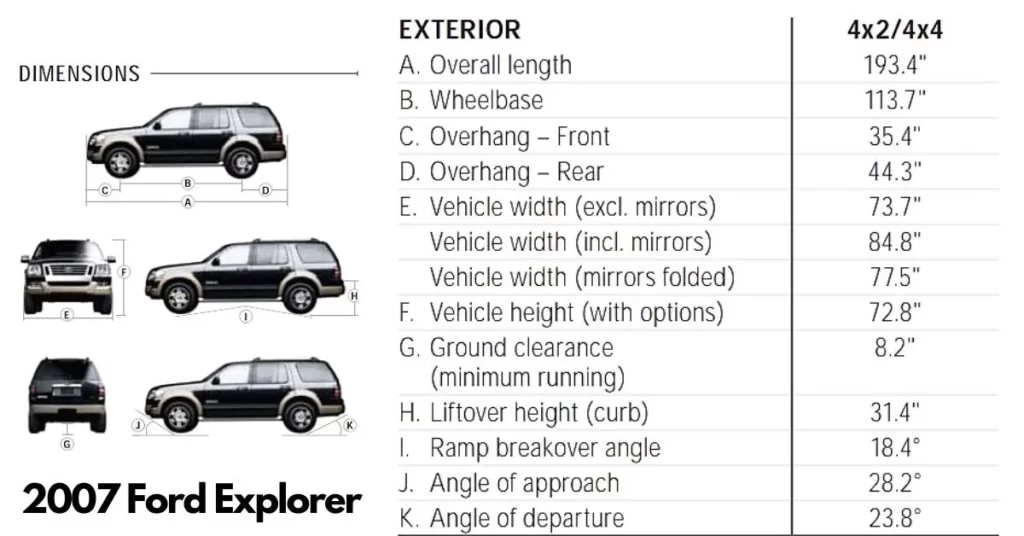
Weight-distributing hitch
Do not use hitches that clamp onto the vehicle bumper; use a load-carrying hitch. You must distribute the load in your trailer so that 10–15% of the total weight of the trailer is on the tongue, not to exceed the maximum tongue load of 500 lb (227 kg) on a Class III receiver.
- Class II receiver: 350 lb. (159 kg)
- Class III/IV receiver: 500 lb. (227 kg) (weight carrying); 740 lb. (336 kg)
When hooking up a trailer using a weight-distributing hitch, always use the following procedure:
- Park the vehicle (without the trailer) on a level surface.
- This is H1 measuring the height of the top (H1) of the front wheel opening on the fender.
- Attach the trailer to the vehicle without the weight-distributing bars connected.
- This is H2 measuring the height of the top of the front wheel opening on the fender a second time.
- Install and adjust the tension in the weight-distributing bars so that the height of the front fender is approximately halfway between H1 and H2.
- Check that the trailer is level. If not level, adjust the ball height accordingly and repeat Steps 3–6.
Note: Do not adjust a weight-distributing hitch to any position where the rear bumper of the vehicle is higher than it was before attaching the trailer. Doing so will defeat the function of the weight-distributing hitch, which may cause unpredictable handling, and could result in serious personal injury.
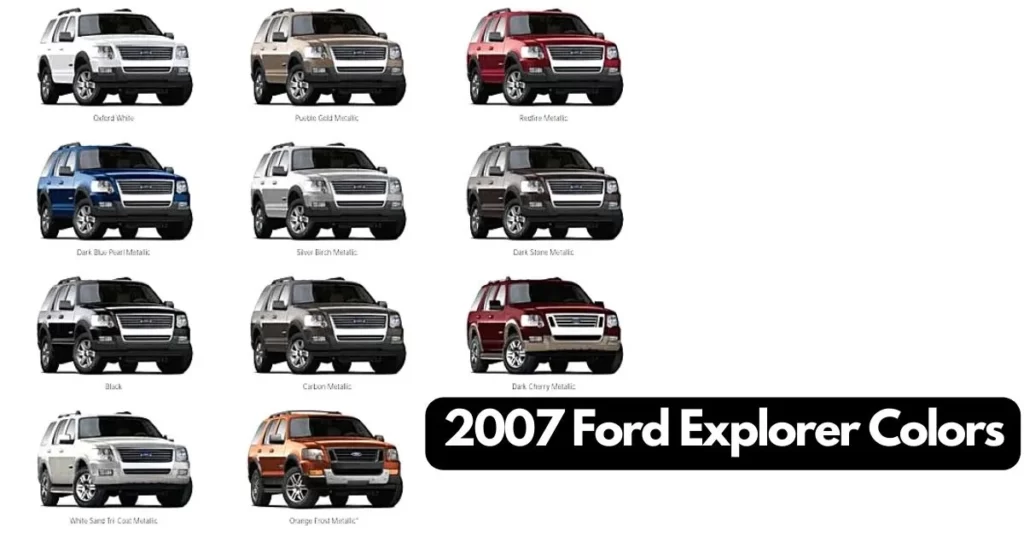
2007 Ford Explorer trims
The 2007 Ford Explorer comes in three models: Explorer XLT, Explorer Eddie Bauer, and Explorer Limited. Let’s find out more about all the details of the maximum towing potential of each of the trim levels of the 2007 Ford Explorer lineup below.
2007 Ford Explorer XLT towing capacity
The 2007 Ford Explorer base trim is equipped with all standard features, plus highlighted features are 16″ painted-aluminum wheels, Body-color bumpers & wheel-lip moldings, 4-bar chrome grille, Black roof side rails, Fog lamps, Black power side view mirrors with security approach lamps, 4-bar design Chrome Grille, AM/FM stereo/single-CD player with MP3 capability, Cloth trim 1st-row bucket seats with 6-way power driver seat, driver manual lumbar, and 2-way adjustable head restraints. The maximum towing capacity when equipped properly is between 3,500 to 7,290 pounds.
2007 Ford Explorer Eddie Bauer towing capacity
The 2007 Ford Explorer EDDIE BAUER® trim is equipped with select standard XLT features, plus: offers 17″ painted-aluminum wheels, Pueblo Gold lower front bumper, 3-bar chrome grille with nostrils, auto-dimming rearview mirror, automatic headlamps keyless-entry keypad, message center compass, Safety Canopy System, SecuriCode keyless-entry keypad, Step bars with Pueblo Gold accents, Leather-trimmed, heated 1st-row bucket seats with 10-way power driver seat, including power lumbar & recline, SIRIUS Satellite Radio, Ford SYNC, Auto-dimming rearview mirror, 4-line message center with outside temperature display and compass. The maximum towing capacity when equipped properly is between 3,500 to 7,290 pounds.
2007 Ford Explorer Limited towing capacity
The 2007 Ford Explorer Limited trim is equipped with select standard Eddie Bauer features, plus: 18″ chrome-clad aluminum wheels, a 4-bar chrome grille, Step bars with chrome accents, Reverse Sensing System, Leather-trimmed, Unique woodgrain interior inserts, heated 1st-row bucket seats with a 10-way power driver seat, including power lumbar, recline, memory; & 6-way power passenger seat with manual lumbar, PowerFold 3rd-row seat, Power-adjustable pedals with memory, Premium Sound System with AM/FM stereo/6-disc in-dash CD changer, subwoofer & 190 watts, Dual-zone Electronic Automatic Temperature Control, Auxiliary rear climate control, and Universal Garage Door Opener. The maximum towing capacity when equipped properly is between 3,500 to 7,290 pounds.
Explore more: 2023 Ford Explorer towing capacity. 2022 Ford Explorer towing capacity. 2021 Ford Explorer towing capacity. 2020 Ford Explorer towing capacity. 2019 Ford Explorer towing capacity. 2018 Ford Explorer towing capacity. 2017 Ford Explorer towing capacity. 2016 Ford Explorer towing capacity. 2015 Ford Explorer towing capacity. 2014 Ford Explorer towing capacity. 2013 Ford Explorer towing capacity. 2012 Ford Explorer towing capacity. 2011 Ford Explorer towing capacity. 2010 Ford Explorer towing capacity. 2009 Ford Explorer towing capacity. 2008 Ford Explorer towing capacity. 2006 Ford Explorer towing capacity. 2005 Ford Explorer towing capacity. 2004 Ford Explorer towing capacity. 2003 Ford Explorer towing capacity.
The load capacity of your vehicle is designated by weight not volume. Towing a trailer places extra load on the engine, transmission, axle, brakes, tires, and suspension. To help minimize how trailer movement affects your vehicle when driving.
Loaded vehicles may handle differently than unloaded vehicles. Extra precautions, such as slower speeds and increased stopping distance should be taken when driving a heavily loaded vehicle.
- Load the heaviest items closest to the trailer floor.
- Load the heaviest items centered between the left and right side trailer tires.
- Load the heaviest items above the trailer axles or just slightly forward toward the trailer tongue. Do not allow the final trailer tongue weight to go above or below 10–15% of the loaded trailer weight.
- Select a tow bar with the correct rise or drop. When both the loaded vehicle and trailer are connected, the trailer frame should be level, or slightly angled down toward your vehicle, when viewed from the side.
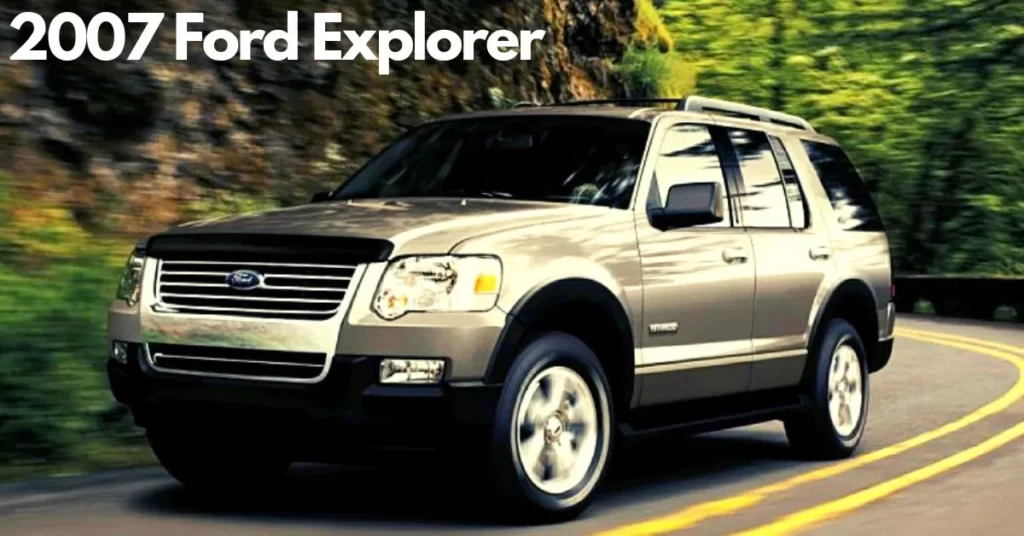
2007 Ford Explorer towing features
The 2007 Ford Explorer is also designed with your safety in mind, having achieved 5-Star ratings in the frontal and side-impact crash tests. Some of the safety features are listed below.
- Adaptive stroking energy-absorbing steering column.
- Adaptive venting driver and front-passenger front airbags.
- AdvanceTrac® with RSC® (Roll Stability ControlTM).
- Belt-Minder® safety belt reminder.
- Front-Passenger Sensing System.
- Front-seat side airbags.
- Intelligent Safety System.
- Safety belts with pretensioners and adaptive load-limiting retractors (adjustable height in 1st row).
- Safety Canopy® System with side-curtain airbags and rollover sensor.
- SecuriLock® passive anti-theft ignition system.
- Tire Pressure Monitoring System.
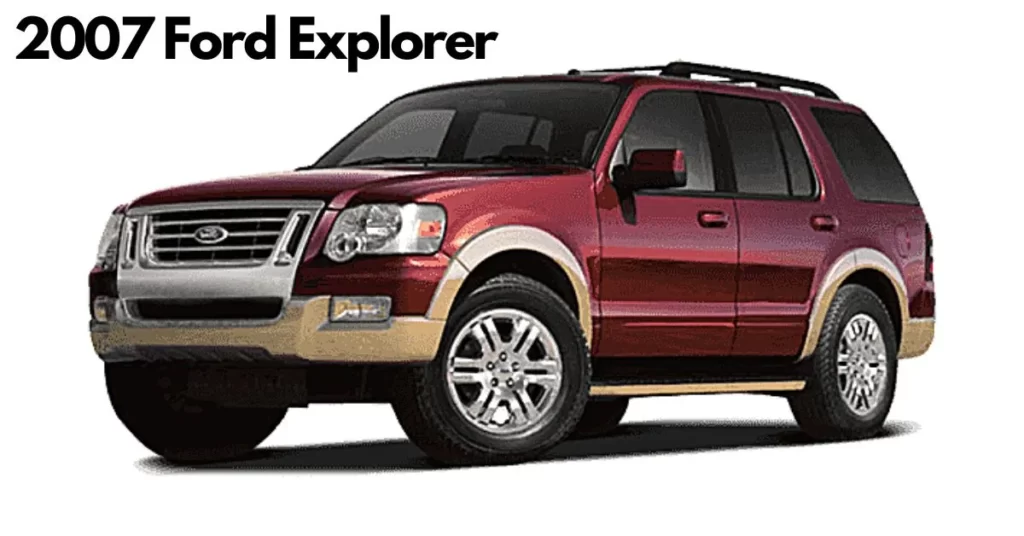
2007 Ford Explorer towing guide
- Do not tow a trailer until you drive your vehicle at least 1000 miles. Also, do not drive faster than 70 mph.
- See the instructions included with towing accessories for the proper installation and adjustment specifications.
- Service your vehicle more frequently if you tow a trailer. See your scheduled maintenance information.
- Check your hitch, electrical connections, and trailer wheel lug nuts thoroughly after you have traveled 50 miles.
- When stopped in blocked or heavy traffic during hot weather, place the gearshift in position P to aid engine and transmission cooling and to help air conditioning performance.
- Turn off the speed control with heavy loads or in hilly terrain. The speed control may turn off automatically when you are towing on long, steep grades.
- Shift to a lower gear when driving down a long or steep hill. Do not apply the brakes continuously, as they may overheat and become less effective.
- Use the Grade Assist or Tow/Haul feature when towing. These provide engine braking and help eliminate excessive transmission shifting for optimum fuel economy and transmission cooling.
- Allow more distance for stopping with a trailer attached. Anticipate stops and brake gradually.
Aaron Bennett is an accomplished author and a true aficionado when it comes to pickup trucks. With an unwavering passion for all things automotive, Aaron has dedicated his life to exploring the world of pickups and sharing his expertise with others. As the proud owner of several powerful machines, he has spent countless hours behind the wheel, navigating rugged terrains and conquering highways with unrivaled enthusiasm.

